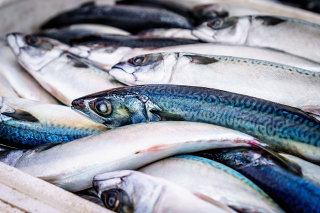Polyunsaturated Fats
Polyunsaturated fats are one of the four kinds of fats found in our food. (The others are monounsaturated, saturated, and trans fats.)

They are found in:
- Vegetable oils (corn and soybean oils)
- Seeds, nuts, and oils made from seeds and nuts
- Poultry fat and egg yolk fat (about 16% to 25% of the fat)
- Fish
- Green leaves (in small amounts)
Polyunsaturated Fatty Acids
Fatty acids are the building blocks of the fats found in food, and also the building blocks of the fats found in our body.
As with fats, there are four kinds of fatty acids (polyunsaturated, monounsaturated, saturated, and trans). The polyunsaturated fatty acids (PUFAs) further are in two kinds: omega 6 and omega 3.
A few PUFAs are particularly important to the human body. The only fatty acids considered essential are PUFAs, and most conditionally essential fatty acids are PUFAs. The essential fatty acids include one omega 6 and one omega 3 fatty acids.
Omega 6 Fatty Acids
Linoleic Acid (LA): essential fatty acid
Gamma-linolenic Acid (GLA): conditionally essential fatty acid
Arachidonic Acid (AA): conditionally essential fatty acidOmega 3 Fatty Acids
Alpha-linolenic Acid (ALA): essential fatty acid
Eicosapentaenoic Acid (EPA): conditionally essential fatty acid
Docosahexaenoic Acid (DHA): conditionally essential fatty acidEssential fatty acids (EFAs) are fatty acids that the body can't make for itself under any circumstances, and must get from the diet. Conditionally essential fatty acids (CFAs) can't be made by the body in some people or under some circumstances.
In The Body
Omega 6 fatty acids are vital to cell membranes, muscles, the liver, and the kidney. They are also buiding blocks for necessary hormone-like chemicals: precursors to the hormone-like eicosanoids (including prostaglandins and leukotrines).
The Omega 6 fatty acid GLA is anti-inflammatory.
Omega 3 fatty acids are necessary for the brain, nervous system, and eye; they are also anti-inflammatory.
We usually obtain these fatty acids from our food, and in the case of the essential fatty acids we must get them from food.
In Food
Omega 6
Vegetable and seed oils: Safflower oil, evening primrose oil, sunflower oil, wheat germ oil, corn oil, walnut oil, soybean oil, cottonseed oil, black current oil, borage oil, sesame oil.
Nuts that are a good source of the fatty acid LA: walnuts, almonds, chestnuts.
Poultry fat.
Chicken eggs: one-third of the yolk is fat and a source of LA.
Omega 6 GLA
Borage oil, black current oil, evening primrose oil.
Omega 3
Seed and vegetable oils: Flax oil, perilla oil. In lesser amounts: black current oil, walnut oil, unrefined soybean oil, wheat germ oil.
Fish and fish oils: Omega 3 fatty acids are found in fish in varying amounts, depending on the species of fish. High sources include sardines, anchovies, and pilchards.
Greens: Purslane is a source of ALA.
About the Oils
Polyunsaturated fats are both (1) more liquid and (2) more unstable than other fats. This has consequences for refining, refrigeration, cooking, and reuse.
Liquid at room temperature
These fats are liquid at room temperature due to a low melting point. Conventionally, a fat that is liquid at room temperature is called an oil. Thus we find it as oil in bottles rather than as spreadable solids.
Corn oil is always liquid.
Arctic fish have more PUFAs than other fish, to keep their bodies from freezing in cold water.
Unstable
These fats are also unstable. They oxidize easily; that is, they easily go rancid.
This is why fish and poultry spoil faster than beef.
Corn and soybean oils are always refined unless specially obtained as unrefined. Refining is an attempt to preserve them and to try to stop the rancidity process.
These vegetable oils, even when refined, go rancid after one use frying.
In contrast, flax seed oil is unrefined. It needs to be refrigerated at all times and never used for cooking. Simply heating it begins the process of spoilage.
An argument can be made that polyunsaturated oils, whether refined or unrefined, should never be used for cooking.
Controversies
The American diet almost certainly contains too much Omega 6 and not enough Omega 3 fatty acids. Americans eat large amounts of vegetable oils (in processed and fried foods) and very little fish, flax oil, or unrefined oils.
Various ratios of omega 6 to omega 3 oils for the diet have been suggested.
It has also been suggested that vegetable oils themselves are the problem; it was not until modern technology that corn oil and soybean oil could be produced.
Traditionally, people ate polyunsaturated fats only in the original foods of fish, nuts, seeds, poultry, eggs, and unprocessed vegetables and greens.
